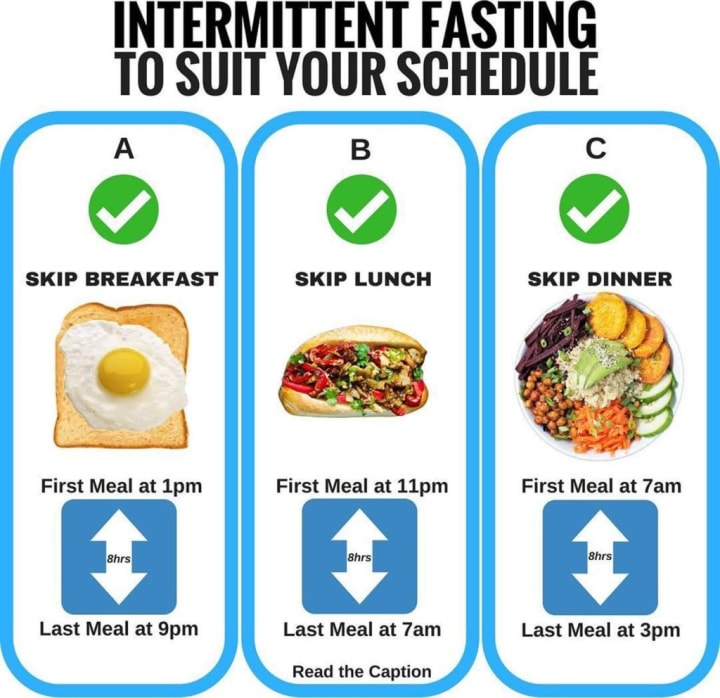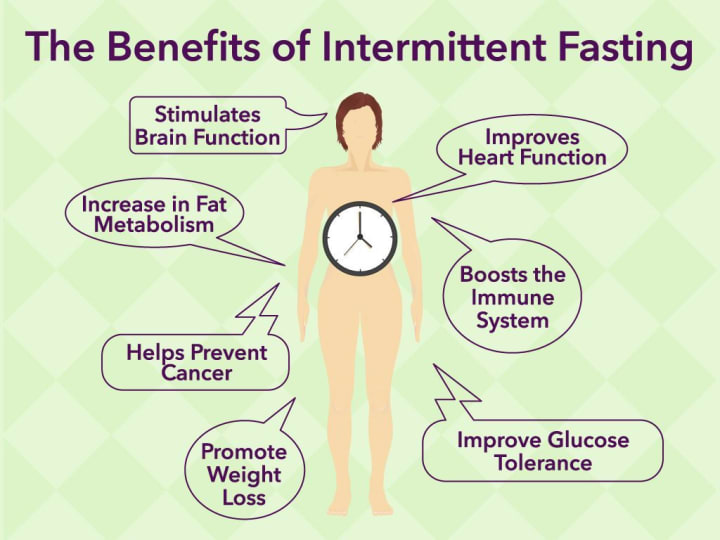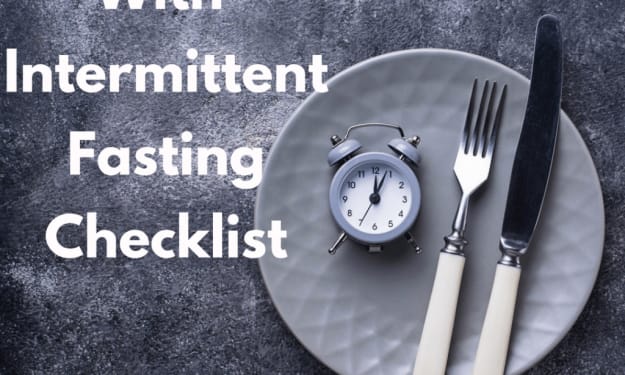How to Get Intermittent Fasting Results Guide: The Intermittent Fasting Factor
What Intermittent Fasting Is & What It Isn’t

How to Get Intermittent Fasting Results Guide: The Intermittent Fasting Factor
Introduction
Hello and welcome to our short, beginners guide on how to finally lose the excess weight and keep it off forever with Intermittent Fasting
Are you tired of diets that tell you what you can and cannot eat? Are you sick of losing weight on a new diet only to see all that weight come back after a few weeks? Do you want your low healthy weight to be part of your lifestyle and identity instead of something you work on when you get “too fat”?
If any of these apply to you, intermittent and fasting might be the answer to all your weight loss issues. Seriously. If you check on the Internet, it seems that everybody's talking about intermittent fasting. It seems to be the long-awaited solution that people have been dreaming of.
As the old saying goes, “Where there is smoke, there is fire.” There’s a reason why people are talking about intermittent fasting constantly. There's a good reason why there's a lot of noise about this concept.
Unfortunately, in the global weight loss industry, there is a lot of hype. It’s very easy to get sold a bill of goods when it comes to the latest and greatest weight loss system. Intermittent fasting is not immune to this. Still, despite the hype, exaggeration, and unrealistic claims about intermittent fasting, it does bring a lot to the table.
This Guide will help you separate reality from hype. What if I told you that you can lose weight by watching when you eat instead of worrying about what to eat? You probably would think that this is crazy because you've been told so many times before that you have to avoid certain groups of foods and eat other types of food.
This is probably the worst thing about dieting for many people. Let's face it. We grow accustomed to certain tastes and textures. If you've been eating meat all your life, it's nothing short of punishment or even an ordeal for you to have to eat mostly fruits and vegetables or nuts and seeds.
The truth is a lot of people are having a tough time switching from one food category to another, and that's why a lot of the diets out there are simply nonstarters. Believe me, this is not for lack of trying.
People jump onto a new diet once they hear that it enables people to lose weight, but eventually, they go back to their old eating habits. That’s just part of who you are. We grow accustomed to certain things. We develop certain habits.
What if I told you that you no longer have to worry about what you eat? Sounds awesome, right? Well, intermittent fasting focuses on timing instead of food choices.
What if I told you that your body has a powerful built-in mechanism that enables you to burn all that pesky stored fat if you simply time your meals correctly? I know this sounds crazy. After all, you've been walking around with that nasty spare tire around your midsection for who knows how many years. You might even be thinking that it is just a permanent part of your body.
People who have gone onto intermittent fasting end up in burning some or all of that fat. I know that sounds crazy. It might even seem unheard of, short of simply switching to a different class of foods.
However, many people who have adopted the intermittent fasting weight loss system happily report that a lot of their fat stores have gone away. This is because when you go on an intermittent fast, you trigger a built-in body mechanism that takes care of your fat stores naturally.
What if I told you that watching your meal scheduling can be a sustainable way to lose weight and keep those pounds off? This is probably the biggest promise and attraction behind intermittent fasting. Hands down, this is what gets the most attention. How come? Well, I’m sorry to report that the vast majority of diets out there simply fail in the long run.
Don’t get me wrong. Don't get too excited or too angry. I know that if you are reading this Guide, you are probably on one diet or another. You probably are even losing weight. I’m not disputing that at all.
However, when you look at the typical diet and its weight loss pattern, very, very recognizable. In fact, if you’ve had any kind of success with any kind of diet in the past, you probably would know exactly what I mean. In the first few weeks or even months, the pounds just melt off. Everything is amazing. Everything looks good. You look in the mirror, and you see that you have lost a lot of weight. Sounds awesome, right?
Sooner or later, your old eating patterns and dietary habits have a way of creeping back and, before you know it, regardless of how much you exercise and regardless of how much you watch what you eat, the old patterns come back. That's right. The pounds start coming back.
Wait, it gets even worse! Not only do you get all those pounds that you lost back, but they bring their friends with them. That’s right! You end up weighing more after your diet than when you began.
For some people, this takes only weeks. For other people, it takes a bit longer. Maybe they can go on for a few more weeks, or they can go on for months or even years but, eventually, if you look at the timeline long enough with most diets, the weight does come back.
I know this first hand. I switched primarily to an all-vegetable diet. I loaded up on fiber, and I felt fuller for a longer time. Everything was great. I lost 50 pounds but, sooner or later, after a few years, the weight came back.
I was at the crossroads. Either I go back on another diet, or I look into something completely new. It hit me like a crystal bullet. Maybe I had it all wrong. Instead of focusing on what I ate, counting my calories, and increasing my daily activities, maybe the answer lay elsewhere.
That's when I discovered intermittent fasting. I made it a point to eat only within my eating window, and once I got used to that, the weight started coming off. Better yet, I got so used to this pattern that I took it to the next level and completely fasted for several days before eating again.
This has now become part of my lifestyle. It's like the back of my hand. I don't even think about it. It's automatic. However, when I look in the mirror, I can see the results. Not only did I lose 50 pounds, but I have kept it off and I don't miss anything. I still eat what I like to eat. I don’t feel like I’m denying myself anything. I don't feel like people have left me behind because they eat all this amazing food and I have to treat those foods as off-limits.
I no longer play those regular diet games because that's exactly what they are. Those are dietary games that you play with yourself when you go on a diet. Certain foods are good and other foods or off-limits.
Well, forget that. Eat what you like to eat. Eat as much as you want as long as you eat within a certain time frame. When I made that switch, it was like switching a radio channel. I started seeing my diet and my overall lifestyle from a completely different perspective, and I became better.
This guide will give you a quick and actionable introduction to intermittent fasting. I’m not going to bore you with theories. I’m not going to drown you with all sorts of scientific statistics and jargon. I’m not going to play all those routine to games that you get when you open a weight loss book.
Instead, I’m just going to give you the information that you need to get started quickly so you can finally get some control over your weight. In hindsight, it wasn’t as hard or as complicated as I thought it was. Seriously. Weight loss is actually not complicated at all. What's needed is a mind shift. If you're reading this guide , get ready because when you dive in, you will make that mind shift, and you will be all that much better.
What Intermittent Fasting Is & What It Isn’t

Let's get real. When you hear the word “fasting,” all sorts of nightmare images come to mind. You start imagining yourself not eating at all. You start thinking about hunger pangs. All sorts of thoughts enter your mind. You feel at the very least that you are robbing yourself of the pleasure of food.
If you're reading this book, you love food a little too much. Own up to it. I did. There's nothing wrong with falling in love with eating.
The problem is when we hear the word “fasting,” we think that it's the end of the world when it comes to our love for food. I've got some good news for you. Despite its name, intermittent fasting doesn't mean you stop eating.
This is what shocks a lot of people because when they hear about intermittent fasting and all the good things that it's able to do for their friends and family, they’re very suspicious. In fact, a lot of people are downright skeptical. They think that automatically it doesn't work. Why? The word “fasting” is part of “Intermittent fasting.”
The truth is you don't fast at all. Seriously. If you define “fasting” as going a whole day without eating, I’m happy to report that you don't fast at all with intermittent fasting. Let’s get that out of the way.
Intermittent fasting is simply all about scheduling when you eat within a day. It's not about resolving to stop eating for the whole 24-hour cycle. That's not intermittent fasting. At least that's not the beginner version of interment fasting.
Scheduled Inter-Day Fast

Intermittent fasting is really all about paying close attention to the periods during the day when you eat and when you don't eat. Believe it or not, there is a large part of your daily schedule when you're not eating. I know that this sounds crazy or even surprising to a lot of people because they’re having a tough time with their diet. They might even be shocked.
Well, don't be. When you look at your typical 24-hour period, what do you see? There is a time that you spend eating. There is a time that you spend going to the bathroom. There is the time that you spend working, hanging out with your family, or having a good time.
What else is there? That's right. Sleep. If you’re like most people, when you're sleeping, you probably are not eating. What do you call a time period when you do not ingest any calories? That's right. That's called a fast.
Believe it or not, you are already fasting. This is already baked into your normal 24-hour life schedule. That's good news. All intermittent fasting breaks down to scheduling this period of fasting and managing it for optimal effect.
The Bottom Line with Intermittent Fasting
The bottom line with intermittent fasting is actually pretty straightforward. You still get to eat. You heard that right. You still get to eat whatever you want, how much ever you want. Sounds awesome?
If you like burgers, go ahead. Eat burgers. If you like sushi, knock yourself out. You have a particular weakness for pasta, go on ahead. You get to eat what you currently eat.
You're not telling yourself that certain foods or off-limits. You’re not putting yourself in a ridiculous position where you're hypnotizing yourself or trying to convince yourself that you no longer have a taste for certain foods. If you like certain foods, go for it. You can eat well.
However, here is the distinction. You have to do so within a time window that complements or enhances your existing fasting schedule. Since people are already sleeping, they only need to add a few more hours to that no-calorie period to trigger intermittent fasting. If you stick to the schedule, you will lose weight.
I know it sounds simple. In fact, it seems almost too simple, but please understand that just like with any other changes to your lifestyle, it takes a little getting used to.
However, once you make that switch, you will see awesome benefits of intermittent fasting. Given that you don't have to stop eating certain types of foods or change your personal tastes in what to eat, this is probably the best thing that has happened to many people looking to lose weight. They don't have to sacrifice burgers, hotdogs, or pizza. They don't have to do that. They just have to watch when they eat.
Why Intermittent Fasting Is Such a Powerful Weight Loss System

Let's get to the nitty-gritty of why intermittent fasting is so popular. Let me cut to the chase. People won't talk about it if it weren’t producing any kind of positive results. Just given the amount of talk surrounding and involving intermittent fasting, one can clearly see that it produces results.
I’m not talking about losing 20 pounds on week 1 and, by the time week 6 rolls around, you’ve gained 25 pounds. I’m not talking about that kind of weight loss. Those diets are all over the place. There's no shortage of that kind of weight loss system.
Intermittent fasting enables you to not only lose weight quickly but to keep it off, not just next week, not just next month, or even next year. If you stick to your schedule, you can pretty much say goodbye to all that extra weight permanently.
The best part of all of this is that you did not change your eating habits. You get to eat what you like to eat. If you like steak and lobsters, you'll still get to eat those. If you're a chicken person, you still get to enjoy chicken dinners at KFC or at home.
Why is intermittent fasting such a powerful weight loss system? Why does it work? There are four key reasons. Keep these in mind.
When you start with intermittent fasting in Chapter 3, always keep these benefits in mind. Wrap your mind around why intermittent fasting works so you can get the focus and willpower you need when it seems a bit difficult. Believe me, regardless of what kind of weight loss system you adopt, there will be rough spots.
You have to keep coming back to why you’re doing something instead of just focusing on what to do, when to do it, and how to do it. While those details are important if you lose sight of why what you're doing works, then it's very easy to lose your resolve. Before you know it, you go back to where you started.
Reason 1: You reduce your overall calorie intake without feeling like you’re “punishing yourself”

As I have mentioned repeatedly in this Guide, intermittent fasting enables you to lose weight even if you continue eating what you like to eat. If you're able to stick to your normal diet, you don't feel like you're punishing yourself. You don't feel like you're doing something really out of the ordinary.
Believe me, if you adopt a vegan weight loss lifestyle, and you used to eat a lot of meat, you can tell the difference. It's a drastic switch. Even if you were to try to gradually move into a totally vegan lifestyle, you can still see the difference. It’s like black and white.
You may be able to keep this up for quite some time but, for most people, they end up going back to where they started. It seems that their old eating patterns just seem to have a way of getting the better of them. We are, after all, human beings. We are creatures of habit.
As awesome as a new lifestyle may be for you and with its amazing health benefits, parts of you will put up a fight. Your mind and your body are used to doing things a certain way. Eventually, your habits will win out. That’s why it feels like you’re punishing yourself when you go on a typical diet. Either you reduce the amount of food that you eat consciously or you switch to a different category of food. Whatever it is, it seems like an ordeal.
Your conscious mind thinks that this is great because you're on your way to weight loss, but your subconscious mind is having a tough time. This is nothing short of punishment. Which part of your mind do you think will win out in the end? Here's a hint. It's not your conscious mind.
With intermittent fasting, you can reduce your overall calorie intake without feeling like this is some sort of punishment. You're still eating what you like to eat but, since you’re sticking to a strict time schedule, the number of calories that you take in on a day-to-day basis start to go down. Before you know it, you start seeing the results when you look in the mirror.
Let’s get one thing clear. Weight loss is actually pretty simple on a mathematical level. It's all about calories in, calories out. Your body requires a certain number of calories for you to maintain your weight. That's right. All that flab and fat requires calories to maintain.
What if you ate fewer calories than you need to maintain your weight? What does your body do? It starts burning fat for energy. That's how it works.
When you reduce your overall calorie intake because of intermittent fasting, you start operating at a calorie deficit. Your body needs to find that energy somewhere in your system so it starts burning fat. The best part to all of this is that it doesn't feel like a hassle. You're not triggering this calorie deficit because you consciously ate fewer calories because you switched to eating only vegetables or eating only high-protein meat.
Reason 2: It is easier to adjust to a feeding schedule than changing food preferences

As the old saying goes, “You can’t make a leopard change its spots.” If you like certain foods, it's going to be very difficult for you to change your food preferences. How come? Those food preferences have been with you since you were a little kid.
Remember when you were 6 years old and you put up a fight when your parents tried to give you more veggies instead of a hotdog? A lot of that remains with you all the way to adulthood. The details may change, but the same dynamic remains.
When you just make it a point to adjust to a different feeding schedule instead of trying to reprogram yourself as far as your food preferences go, you would get better results. Best of all, these changes will last longer.
Don't get me wrong people make the switch from one type of food to another all the time. I’m not disputing that. That’s the main reason why there's a multibillion-dollar diet book industry in the world. What I’m pointing at is the reality behind those billions of dollars.
The reason why those diet books make so much money is that people fail in their diets. When they try to change their food preferences, they soon find out that they can't do it. So, what do they do? They buy another diet book talking about other food preferences. Once that fails, they then switch to another book and on and on it goes.
With intermittent fasting, you break free of that cycle. You focus instead on your feeding schedule. That is the way out.
Reason 3: Intermittent fasting pushes people to eat more efficiently

Let’s put it this way. When you were a kid, you probably were in a situation where you realize that you're running out of time to do your homework. What did you do you when you realized that you only had an hour to do your homework? Chances are if you’re like most kids, you do your best to complete your homework within that allotted time. You’d be surprised as to how quick, efficient, and effective you could be if you're operating with a high sense of urgency.
Intermittent fasting applies this same principle. Since you know that you only have a certain time frame in which you can eat whatever you want, you are training yourself to eat more efficiently. For example, if you know that certain foods are going to make you feel fuller for a longer period, you're probably going to eat those instead of foods that you “graze” on. These are the kinds of foods that you have to pretty much eat throughout the day for you to feel full.
A lot of this is not conscious. A lot of this just falls into place as you work with your feeding schedule. Eventually, you start eating more calories per meal but, eventually, this leads to weight loss. Why? You may be eating more calories per meal but since you're eating fewer meals because of your time frame, the net effect is positive. You take in fewer calories than you need, and you burn fat.
Reason 4: Ketosis

Intermittent fasting enables people to eventually trigger ketosis. This is a point where your body burns fat for energy instead of blood sugar. For this to happen, blood sugar has to flush out from your system long enough so your body can switch to burning fat for fuel.
Ketosis doesn’t take place when you start intermittent fasting. In the beginning period of a typical intermittent fasting protocol, there simply is not enough time for ketosis to kick in. However, once you get used to eating only within fixed feeding schedules, you start building the discipline needed to go on full-day fasts.
In other words, you would be able to eat two days straight and then go on for one day without food and then go back to eating. Once you get used to that, you can then go to two days eating and then two days fasting. When that happens, ketosis enters the picture. This is when your body stops getting its energy from your blood sugar and starts tapping your fat stores instead. You then cut off ketosis when you start eating again.
When you switch to low-carb, high-fat food sources, you can then turbocharge ketosis’ effect, but I’ll get to that later in this Guide. The point that I want you to take away from this section is that ketosis can be part of the picture. This is crucial because if you are struggling with belly fat, you need ketosis to happen.
Keep the reasons above in mind once you start intermittent fasting. These are the reasons why intermittent fasting works. By focusing on them, you will make your transition to a fixed eating window easier. Focus on the why instead of other questions. That is the way forward.
That's it for the article, like , comment and share with your family. If you really like my work then you can send me a tip as a gift so that I can provide you such content.
About the Creator
Mustafa Rangoonwala
Hello Reader,
My Name is Mustafa Rangoonwala, I am an Holistic Practitioner since last 7+ Years. I am a Graphologist, NLPMP, Reiki Master Practitioner, Ganotherapist and Vastu Consultant.
I have recently joined Vocal..Support me !!!!!!





Comments
There are no comments for this story
Be the first to respond and start the conversation.